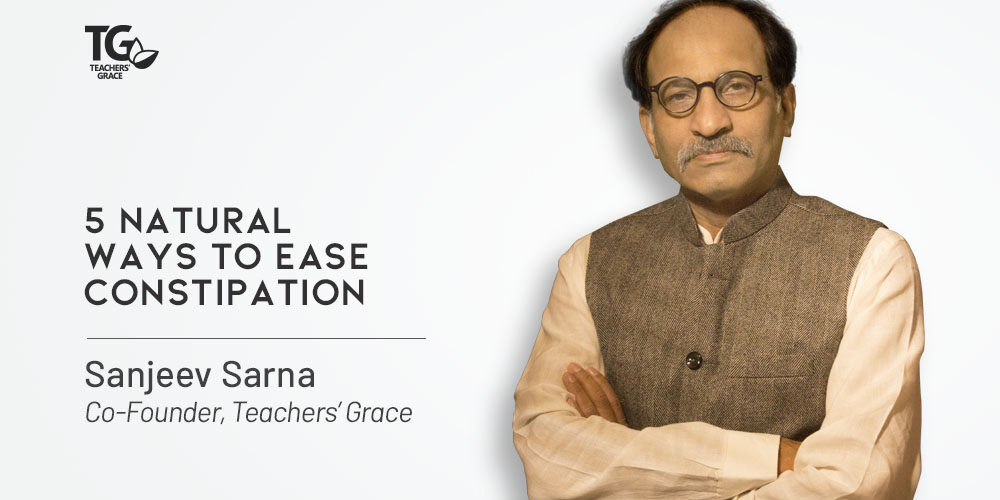No products in the cart.
All the movements in the human body are enabled by the Vatta system of energy; also referred to as kinetic energy system. The movements enabled by Vatta are breathing, circulatory system, nervous system, excretory system, cell division, control the entire sensory organs, muscular contraction and relaxation, absorption and secretion, digestion and assimilation, cell proliferation, genetic code transferring, responsible for wear and tear phenomena of the body, and elimination.
According to the Ayurvedic concepts, constipation is a Vatta disorder. Due to irregular and improper lifestyle, unsuitable and unwholesome dietary habits, lack of appropriate physical exercises, Vatta gets vitiated.
The colon is the main seat or root of the Vatta therefore, primarily it affects the colon. Aggravated Vatta starts drying the fluid of the faecal material by increasing fluid faster absorption and thereby making it hard to pass.
The entire nervous system is under the control of Vatta, and elimination of stool is controlled by both, Somatic nervous system and Autonomous nervous system. Internal sphincter muscles are controlled by autonomous nervous system and external sphincter is by Somatic nervous system. Once the rectum is full with the faecal material, it increases pressure on the rectal wall, leading to defecation reflex which causes contraction of rectum to spell out stool smoothly. Aggravated Vatta affect the entire process of defecation reflex and rectal contraction at the same time, this leads to dryness of faecal material which finally causes constipation. Modern science accepts that in 24 hours approximately 9 litre gas forms in the large intestine, nearly 7.5 litre gets absorbed and 1.5 litre gas gets passed as flatus.
According to the wisdom of Ayurveda, 3500 years back they have described that large intestine is the root of Vatta. Vatta as a system enables all the movement and elimination of waste material from the body. The imbalance of the Vatta system, labeled as Vatta dosha, the doshic attributes of Vatta that are cold, dry, and hard properties adversely affect the colon and its proper functioning.
In classical Ayurveda text, disease, symptoms & state similar to constipation is referred to as Vibandha. Both classical Ayurveda & modern medicine converge on the aspect of Constipation. Constipation is when an individual experiences infrequent and fewer bowel movements or hard-to-pass solidified hard stools, painful defecation and feeling of bloating, abdominal discomfort or incomplete elimination.
Painful defecation is a common cause of constipation. Obstructive & severe constipation is called obstipation (failure to pass stools or gas, Intestinal obstruction, severe constipation.), and faecal impaction, in a few cases, can lead to bowel obstruction and become life-threatening.
Constipation is a very common gastrointestinal disorder experienced by most people at some time during their lifetime. Various conditions can cause constipation by way of disrupting the normal process of absorption, stool formation and propelling out of faeces from the large intestine.
In most cases, constipation occurs on account of a poor diet with insufficient fiber, inadequate fluid intake, undisciplined lifestyle or at times a side effect of certain medication. At times it may happen because of some mechanical obstruction or a serious ailment such as colon cancer.
Some people are born with a weak intestinal system and have a natural tendency towards constipation.
Constipation is observed mostly in older people. With advancing age and decreased mobility, lack of appetite, dietary changes, medication and weakened intestinal function, older people are more prone to suffer from constipation. The exact figure on the prevalence of constipation is not known. Women are more prone to constipation as compared to men, especially pregnant women.
 1) Processed Infant foods
2) Lack of toilet training during toddlerhood.
3) Soon after starting playschool
1) Processed Infant foods
2) Lack of toilet training during toddlerhood.
3) Soon after starting playschool
 Yoga Asanas have a solution to all problems related to the human body, and hence it is very effective in easing constipation.
Every morning 15 minutes to each Pranayam- Kapal Bhatti & Anulom-Vilom can alleviate constipation.
Also, Yoga asanas involving the pelvic region, such as Bhujangasan, Pavanamuktasana, Shashankasana, Sarvangasana, Mandukasana and Dhanurasana, are helpful too in this situation.
Yoga Asanas have a solution to all problems related to the human body, and hence it is very effective in easing constipation.
Every morning 15 minutes to each Pranayam- Kapal Bhatti & Anulom-Vilom can alleviate constipation.
Also, Yoga asanas involving the pelvic region, such as Bhujangasan, Pavanamuktasana, Shashankasana, Sarvangasana, Mandukasana and Dhanurasana, are helpful too in this situation.
Common causes of constipation in children
 1) Processed Infant foods
2) Lack of toilet training during toddlerhood.
3) Soon after starting playschool
1) Processed Infant foods
2) Lack of toilet training during toddlerhood.
3) Soon after starting playschool
Common causes of constipation in adults & elderly
When the body is not adequately hydrated, the large intestine absorbs too much water from the stool, which results in dry and hard stools; these stools are difficult to pass. This occurs on account of inadequate contraction of bowel walls to eliminate the stool and waste product.- Improper diet-low on fiber intake
- Lack of exercise and mobility
- Age and stress-related
- Ignoring the urge to defecate.
- Insufficient fluid consumption
- Medications (antacids, anti-histamines, antipsychotic drugs, aspirin, beta blockers, anti-hypertensive drugs, iron and calcium supplements, diuretics, calcium channel blockers etc.)
- As a side effect of certain diseases such as (hypothyroidism, anal fissure, chronic renal failure, colon or rectal cancer, hypercalcaemia e.t.c.)
- Obstructive Constipation – Obstipation
Commonly experienced symptoms of constipation
- Hard painful stools
- Gas, Abdominal discomfort or bloating
- Straining of blood during the passage of stools
- Headache, inertia
- Malaise
- Continuous discomfort
1. Drink at least 3 to 4 litres of water every day
Constipation usually occurs when the body does not get enough water. The reason most people get affected by constipation is Dehydration. To prevent this, it is essential to stay hydrated and drink at least 3 to 4 litres of water daily. Drinking 2 to 3 glasses of water, preferably lukewarm, very soon after waking up in the morning is also very beneficial in constipation.2. Perform Yoga Asanas and Pranayama Daily
 Yoga Asanas have a solution to all problems related to the human body, and hence it is very effective in easing constipation.
Every morning 15 minutes to each Pranayam- Kapal Bhatti & Anulom-Vilom can alleviate constipation.
Also, Yoga asanas involving the pelvic region, such as Bhujangasan, Pavanamuktasana, Shashankasana, Sarvangasana, Mandukasana and Dhanurasana, are helpful too in this situation.
Yoga Asanas have a solution to all problems related to the human body, and hence it is very effective in easing constipation.
Every morning 15 minutes to each Pranayam- Kapal Bhatti & Anulom-Vilom can alleviate constipation.
Also, Yoga asanas involving the pelvic region, such as Bhujangasan, Pavanamuktasana, Shashankasana, Sarvangasana, Mandukasana and Dhanurasana, are helpful too in this situation.
3. Healthy Eating habits to cure constipation
Eating habits are directly connected with your digestive system, and they help you with strong and healthy digestive system. By including the following foods and ingredients to your daily diet, you can gradually help yourself towards alleviating constipation:- Make 3 Dry Figs, 25 Raisins, and 10 Munakkas (Currant) part of your breakfast as they are extremely healthy in improving digestion
- Add Wheat Daliya to your breakfast
- Having 10 Almonds and 2 Walnuts each day can act as medicines for constipation
- Add multiple fruits to your daily diet – Apple, Pears, Kiwi and Citrus Fruits improve symptoms of constipation. Eat 2 Chikoo daily whenever available
- Increase Salad and Greens intake and say goodbye to carbs
- Bhindi (Ladyfinger) is the great remedy for constipation. Eating it regularly helps.
- Add one spoon of Almond Oil to hot milk and drink twice a day, preferably
- Every morning drink a warm glass of water (not hot) mixed with a tablespoonful of honey – For Non-Diabetics
- Drink Bel ka Sharbat; it is an excellent coolant. It hydrates the body and also an amazing digestive
- Avoid consuming any meat as it takes longer to digest and is not at all helpful for constipation
- One tablespoon of flax seed before going to bed
4) Consume Isabgol-only as a short-term solution
Sometimes constipation results due to lack of fibre, and in such a situation, Isabgol plays a major role as it is rich in fiber and used as a cure to ease constipation for ages. The best way to consume Isabgol is to add 2 small spoons of Almond Oil &shakkar(Coarse, unrefined sugar) in one tablespoon of Isabgol, to be consumed with hot milk or hot water However, it is helpful in the first few years of usage, and prolonged usage can be more harmful than beneficial.5) Apply Almond oil on Anus
Application of Almond Oil to the anus twice a day, over a period of time, helps in easing out constipation You can also put it a little bit inside too for better results.What to avoid
- Avoid irregular food habits, heavy, unwholesome, excess oily and spicy food items, bakery and preserved items
- Avoid suppression of natural urges, excess tea, coffee, smoking
- Avoid using self-medication
- Avoid prolonged usage of Isabgol and laxatives containing Senna leaves


